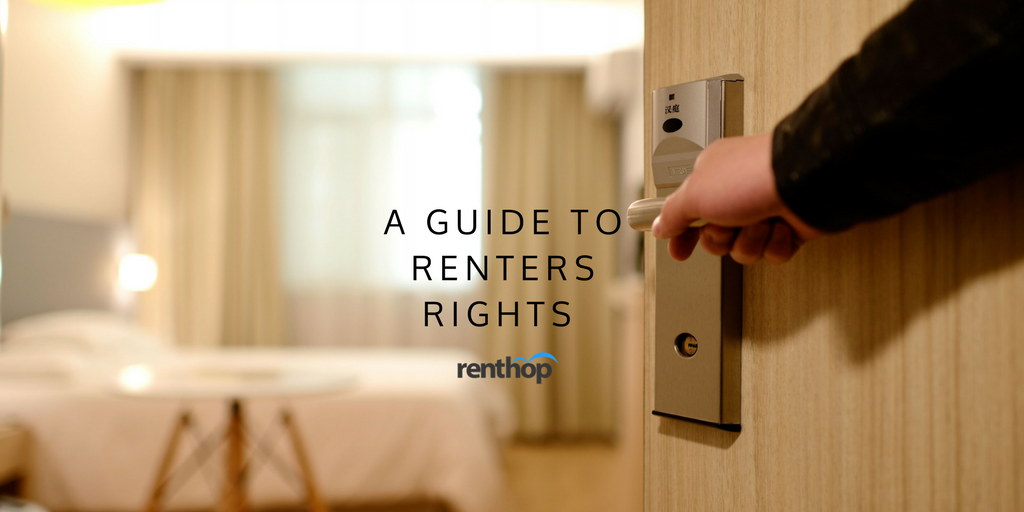If you are a tenant renting an apartment or a room in a home, you have many different rights. These can apply to your relationship with your landlord and even your roommates or neighbors in some cases. In New York City, there are various renter’s rights that protect tenants from unfair actions. Landlords cannot randomly raise the rent in the middle of the lease and must abide by lawful evictions.

However, if you are unaware of your renter’s rights, it is impossible for you to assert them. You might not even be aware that the situation you currently find yourself in is unlawful. So with that in mind, we have created this article so you can know and better understand the variety of different rights you have as a renter.
While the precise and exact rights of a tenant can vary depending on the state and country that you live in, many of the rights you will see within this article are universal and should apply to almost all rental agreements. So without any further ado, let’s take a closer look at some of the many different rights that you as a tenant have.
Renter’s Rights
Renters in New York City have the following renter’s rights. To learn more, check the city’s website.
Your Right to Privacy
Even though you don’t own the apartment or room you are renting, you are still entitled to have a little bit of privacy. In fact, most states say that a landlord has to give prior notice to tenants before entering their apartment. The amount of time varies from state to state but can be anywhere from 12 hours to 48 hours in most cases.
Maintenance and Fixes
If you find that something in your rental unit is not working (and you haven’t broken it or damaged it), then you have a right to have that fixed for you. Your landlord needs to make sure your unit is livable, simple as that. This applies to all the main fixes such as electrical, plumbing, heating, leaks and even pests such as cockroaches or bed bugs. In some cases, landlords may also be responsible for smaller fixes such as leaky faucets, worn out flooring or damaged wallpaper. If your landlord is not willing to fix things in your apartment, they are likely ignoring your rights.
When the Landlord Increases Rent
Yes, in short, a landlord can raise the rent. However, this comes with a lot of caveats. If you have a lease, the landlord cannot increase the rent until the lease is over (unless there is a term within the lease that allows for them to do so). If you rent on a month-to-month basis, they can raise the rent after giving you the appropriate amount of notice, which is 30 days in most states. So if they try to raise the rent out of the blue, that is not allowed.
Return of the Security Deposit
One of the most common arguments and disagreements between tenants and landlords is about security deposits. If you adhere to the terms of your lease, you should receive your full security deposit. However, some landlords will find any reason keep all or part of your security deposit or will try to delay it, which is a clear violation of your rights.
Landlords and property managers have 14 days after the last day of the lease to send a notice that they will withhold part of the security deposit. The renter has the right to an itemized list of the reason for any withholdings. The landlord must send the funds within fourteen days as well.
Right to Rent
Federal law prohibits a landlord from discriminating against anyone, no matter their race, religion, sex, sexual preferences or age. So no matter who you are or what you believe in, you have a right to have the same shot at renting an apartment that anyone else does. This doesn’t mean landlords can’t deny you an apartment for legitimate reasons. It just means that they cannot deny you housing based out of discrimination.
Tips for Renters to Protect Themselves
There are many ways that tenants can protect themselves by using their renter’s rights. Additionally, they can take the following steps:
Document Everything
In order to prove a landlord violated your renter’s rights, you will need proper proof. That is why it is important to document everything from repair requests to email conversations you have. Even if you never get in a rights disagreement with a landlord, it is always a good idea to remain prepared if things get sour.
Potential Ways Landlords Can Evict Tenants
As a renter, you have a right to feel safe and secure in your apartment. Part of this means you don’t have to worry about being randomly evicted without cause or notice. If you are abiding by the rules set out in your lease agreement and not breaking the law, there are very few reasons for you ever to be evicted. Despite this, there are a few different reasons why you could get evicted. Not paying rent (or paying it late regularly), causing damage to the apartment, constantly disturbing other tenants and other delinquent activity can lead to eviction. Reading and knowing your lease agreement front and back is the best way to ensure you know what you can and can’t be punished or evicted for.
Conclusion
Renters have the rights outlined in this article. Renters who do not know their renter’s rights will therefore not know if someone takes advantage of them. When you know your rights, you have more power to call out a landlord for violations.
Editor’s Note: We updated this article to enhance readability.




